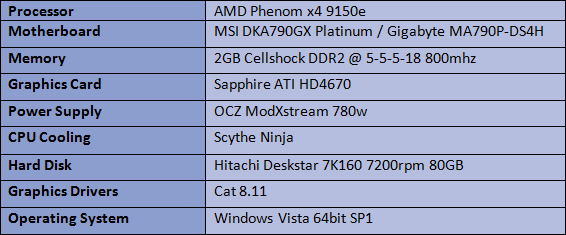AMD 790GX Head to Head
During the testing of the setup above, special care was taken to ensure that the BIOS settings used matched whenever possible. A fresh install of Windows Vista was also used before the benchmarking began, with a full defrag of the hard drive once all the drivers and software were installed, preventing any possible performance issues due to leftover drivers from the previous motherboard installations. For the 3DMark and gaming tests a single card configuration was used.
• Sisoft Sandra XII 2008c
• Lavalys Everest 4.0
File Compression & Encoding
• 7-Zip File Compression
• River Past ViMark
Disk I/O Performance
• HDTach 3.0.4.0
• Sisoft Sandra XII 2008c
3D / Rendering Benchmarks
• Cinebench 10
• 3DMark 05
• 3DMark 06
3D Games
• Bioshock
• F.E.A.R
• Unreal Tournament III
Using a maximum Vcore of 1.45v. the Gigabyte motherboard attained the highest stable clockspeed of 2448 MHz. FSB testing was a null point as regardless of CPU multi, the highest attainable FSB remained the same so the Gigabyte won out here as well scoring 12 MHz higher than the MSI. Any higher FSB resulted in a non-boot scenario which was slightly disappointing but considering each board managed a 500+MHz overclock, this is still a good achievement.



